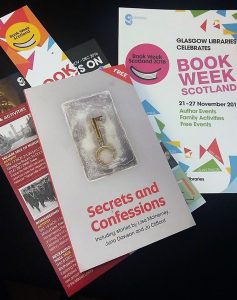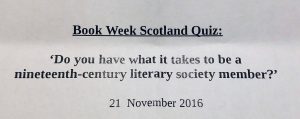For Book Week Scotland, Katharina Dittmann and I decided to nerd our little hearts out. And where did we decide to go, you ask? To the library, of course! Specifically, the beautiful Mitchell Library in Glasgow, where we attended a talk given by Lauren Weiss, a PhD student at our very own University of Stirling.
The talk started off with a quiz. Needless to say, we now have ample proof that we would not fit into the nineteenth-century literary crowd.
According to Lauren, Glasgow has always been a city of readers and writers. In the 19th century men (and later women) got together to talk about books and reading. A ‘typical’ nineteenth-century literary group would meet up once a week. Reasons for joining a literary group usually had less to do with a love for literature and more to do with networking — networking isn’t just for us publishing students! Becoming a member of one of these groups would enable a young man to meet other people in a new place, people who could help him find a job and a place to live. This does not mean that there wasn’t an emphasis on the act of reading. Members were required to read for at least half an hour every day.
Many such societies had their own manuscript magazines. However, membership to a society wasn’t always needed to contribute to its magazine. These magazines weren’t quite as ‘literary’ as one might imagine. There were a variety of topics that people chose to write about. For example, a more traditional piece of literature like a sonnet could be followed by an essay entitled ‘Ants and Their Ways of Life’. Members weren’t always sticklers when it came to deadlines, making the editor’s job the hardest of all. In fact, the editor would quite often have to include last-minute contributions just as they were. Magazines would then be passed on from member to member, who would all critique their fellow members’ works.
then be passed on from member to member, who would all critique their fellow members’ works.
Between 1800 and 1914 Glasgow had at least 140 literary societies — less than ten of those are still running. A dismal figure until one thinks of all the reading groups (read: with wine) that people are a part of in today’s Glasgow. Reading is still a big part of the culture there, just in slightly different forms.
At the end of the talk, Dr Irene O Brien, Senior Archivist, and Patricia Grant, Library Collections Manager, spoke to us about the Mitchell’s unique collections. Fascinated by the wonders that the Mitchell holds within itself, we completely forgot what time it was and almost missed our train!
